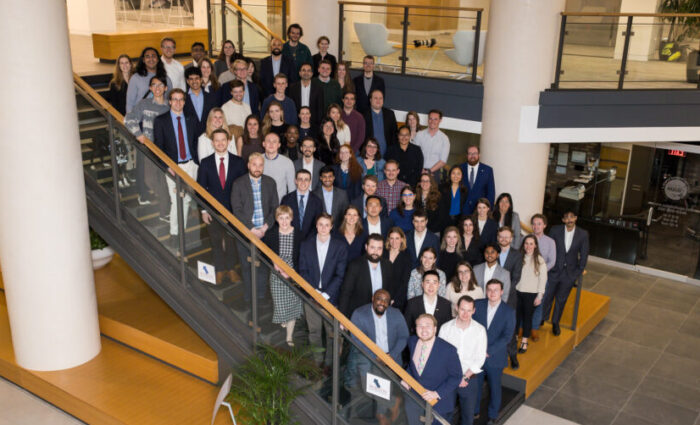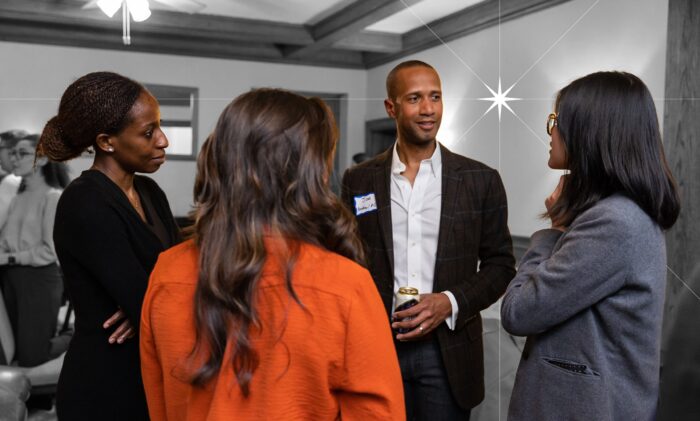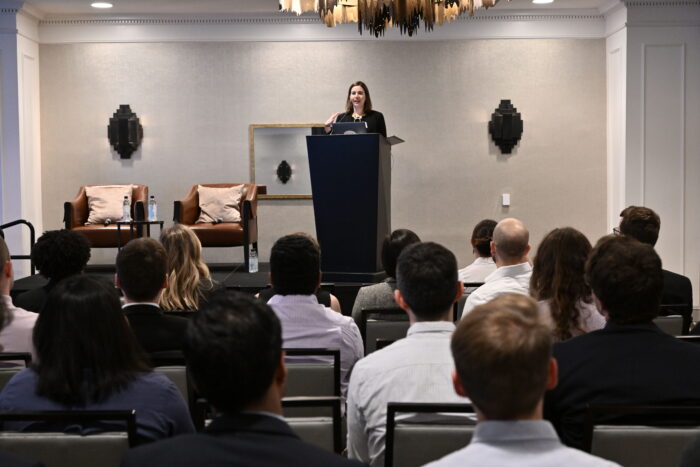Fellow Q&A: Joseph Keller
This is part of our fellow Q&A series to give prospective applicants and other interested audiences a glimpse at what it’s like to be a Horizon Fellow.

Your background is originally in neuroscience — you received a PhD in cognitive science from MIT before working at the NSF. What made you interested in neuroscience?
I came to neuroscience the way that many people get into neuroscience, or brain sciences more broadly, which is that I had a bunch of things in my head that I needed to sort out, and I thought perhaps the research itself would help me better understand how my own brain works. The nature of my research was really interesting: we were trying to combine our understanding of human behavior with our understanding of brain imaging to tell a story about how humans navigate the world. My specific focus was on how humans can make memories and recall them. I was really interested in attention and mind wandering, which I still am today through meditation. So, part of my interest in neuroscience was very personal.
At one point, I was very interested in Alzheimer’s disease and dementia-related diseases that affect older adults. I did some research on the topic, and in particular on the questions that needed to be asked before you could make a clinical diagnosis. In hindsight, I also appreciate how the understanding of the human brain and human behavior helps me ground my understanding of AI. I don’t always get the chance to use that focus, but I’m really excited when those connections come together.
As a scientist, did you always want to transition into policy?
No, I didn’t, actually. Right after my PhD, I joined an executive search firm as a nonprofit recruiter. This was mostly working in healthcare, STEM, and higher education — I was looking for presidents of universities and provost deans, but also leaders for zoos and symphony orchestras. These were civic sector institutions that are mission driven, where helping people was the main focus, not the bottom line. I got to interact with a lot of amazing leaders from around the country and around the world. I noticed in talking with them and learning about their backgrounds that their journeys included work in the public sector at multiple levels. I was familiar at that time with the AAAS Science and Technology Fellowship. There were many people around me who were trying to find different jobs out of the lab. Management consulting is always one option, policy is another. But it really struck me in looking at these leaders that they were able to weave together academic backgrounds with government service and sometimes industry work as well. So it really brought home to me that there was a lot of opportunity to make an impact in policy through government service. That was the final straw that led me to apply and move down to DC.
You now work as an AI fellow at the Brookings Institution. How does your think tank work compare to both your experience in academia as a PhD student and then your public sector work at the NSF?
That’s a really great question. It’s been kind of like doing another PhD, but without any rules or expectations. In my case, I’ve gotten to put together my own research agenda, to formulate thoughtful policy questions and to do research on them closely. I think the motivations for doing the work differ across the sectors. In academia, the motivation is often to influence your field of interest. It’s often hard to move the needle as an individual, and many of the criteria for success in higher education metrics have to do with journal citations and publications, which is not the same as having a tangible impact. I think in the public sector, it’s really inspiring to look at decades of service that people have at organizations, and even though it’s hard to discern exactly what one individual can accomplish, it’s inspiring that there’s a really intentional commitment by folks to work in the public sector, who are willing to be a part of the machine and recognize that in totality, cumulatively, that they’re able to be a part of progress and success. When it comes to think tanks, it really brings me back to trying to assess, well, how do you gauge impact and what does success look like in the think tank world? And I think across those three different arenas – academia, the public sector, and think tanks – success has a different definition.
You have written about the state of technology in Africa, including underwater sea cables and AI. What should US policy-makers know about Africa’s technological development?
Well, I think it’s a fascinating research area, mostly because the continent of Africa will be the future of technology. I think that’s probably the main theme that US policy-makers should understand. The continent has a very young population. So, when thinking about who will be the users and workers in a digital future, Africa is where many of them will live. Also, it’s a space where a lot of rare earth metals are found. It’s become, as a result, a place where geopolitical conversations take place, and many of them, unfortunately, occur around the continent and its citizens and leaders and countries without including them.
I think what’s happening now is we’re gradually seeing that change. African countries have exhibited a lot of agency on the global stage, especially when it comes to technology, deciding where there are partnerships and opportunities that suit their citizens and their government operations best, and disregarding fights that don’t concern them. What US policy-makers understand now is that the value proposition of partnering with the US versus partnering with adversaries is no longer straightforward for African countries, and that the US policy-makers should really bring tangible value to the table in African partnerships.
You’re teaching a class at Georgetown on the “Global Governance of Artificial Intelligence”. What are some key themes you are emphasizing in that class?
Oh, man, you currently catch me in the middle of it! I think the course is grounded in the fact that collaboration and coordination will be essential to the future global governance of AI. So in the class, we try to facilitate conversations and research activities, and try to understand the factors that will help enable successful conversations, collaboration, and coordination.
One of the things that we’re noticing is that there’s many more stakeholders and important institutions that are critically important to these conversations than the ones that are typically recognized. It’s not just about the US, China and the European Union. There are intergovernmental organizations, there are alliances, and they factor in differently to these calculations. And then lastly, I would say regarding how it’s going to play out, it’s really uncertain. We’re not really sure how we’re going to have productive and practical activity at the global level.
What has been one challenge of your policy work so far?
Probably the biggest challenge is trying to put together my own research agenda that is thoughtful and meaningful and has potential to ask questions that are important to drive impact. There are so many interesting things happening, particularly in the world of emerging technology. It’s easy to spread too thin. Are you thinking about geopolitical issues? Which countries, which parts of the world? Are you thinking about security and defense? Are you thinking more about domestic policy or foreign policy? State or local policy? There are new developments almost every single day, especially in topics like AI, which change all the time. So I’ve found it difficult to put together a research agenda that allows me to ask an important question that will still be relevant and meaningful to ask six months from now, and to figure out the best way to share my findings with the world.
Given all of those considerations, what are the research topics that are most on your mind these days?
My research interest is changing in part due to my research strategy. In the first year of my Horizon fellowship, I was focused on really trying to go after an underappreciated or under-researched topic, which led me to research tech infrastructure in the global south and underwater cables in particular, as well as data centers. I think as my interest and knowledge has expanded, my research focus has become broader. So at the moment, I’m interested in quantum computing and quantum information science as another important emerging technology. I’m interested in having conversations about governance and coordination at the global level. I’m also interested in climate change, and in particular how the AI ecosystem requires a lot of resources, not just in energy, but also natural resources, rare earth minerals, and water. How do these very strong trends potentially interact with each other in the future? How can we be thoughtful about how we craft policies that are more proactive than reactive? I’d also say that a future version of myself is really interested to learn more about neurotechnology, and especially its national security implications.
You’ve done a lot of public engagement work, including writing op-eds for Lawfare, The Hill, and Foreign Policy. Can you speak about the importance of public engagement for think tank researchers?
I think public engagement is really important, particularly in my role at a think tank. But, I also think the type of public engagement you do depends on what your goals are. One important consideration is who you’re speaking to: it’s important to identify who your audience is, whether you want to spread a message that reaches one million people or just a handful of specific people. That can determine whether or not you do a a podcast, an op-ed, a commentary article, or a research paper that’s 30 pages long. Is it about eyeballs in general, or someone’s eyeballs in particular?
One of the audiences I’ve been thinking about recently is Congress. I have been a part of conversations with folks at the federal level about some of these important issues, mostly behind closed doors, and they are asking very important questions about emerging technology. There’s a consistent conversation between folks in think tanks and actors at federal agencies. I definitely now have a greater appreciation for how those discussions take place as a result of my think tank work.
What has been a highlight of the Horizon fellowship so far?
The coolest part has been coming full circle by seeing many of the people we met in the training portion of the fellowship in the work I’ve been doing. I’ve ended up reading some of their papers or seeing those people in my day-to-day work. I’ve really appreciated the relevance of the training exposure that fellows have been given — it really does fit in to our work! The conversations we had will stay relevant both during and after the fellowship.
What advice would you give to someone who is applying for the Horizon Fellowship?
I would say to prospective applicants: there’s so many topics that people are working on, from space tech to other emerging technology topics. I would encourage folks to be specific about what your interest and intention is, what you’d like to focus on, and overall what type of experience you want.
As an interesting twist, I had different interests for where I wanted to do my fellowship, and I was encouraged by Horizon to consider working at a think tank. I would say that without Horizon’s encouragement, that was something I wouldn’t have thought of. So, even though it’s good to have an initial focus, it’s also good to be flexible in how this fellowship can be a part of your story.



